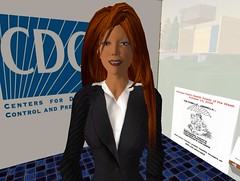The Next Generation of Teachers Published 2007-03-22
Will Richardson has a very interesting post reflecting on a recent visit with a class of pre-service teachers. Link to post. Be sure to read the discussion that follows. There are some really smart comments.
I particularly liked Kevin Prentiss' contribution:
... Early adopters are always a small percentage. Most people don’t ever “get” contextual shifts in a society, they just start using new tools /ways when everyone else does.
How many iPod users read, understand, or care about the “Long Tail” - but many of them buy the heck out of obscure songs they found on myspace without giving it a moment’s thought.
I agree with Kevin to the extent that as the technology becomes "ubiquitous", more and more teachers will incorporate it into their teaching. But I think that a distinction needs to be made between two aspects of Will's vision: the first is the technology (e.g. the read/write web) and the second is the pedagogy (student centered / constructionist). I have seen a good number of teachers incorporating technology like blogs and digital media into their classes. But they remain teacher-centric. I would argue that this is not a discouraging development, but actually encouraging.
Changing one's tools is an incremental change or one that is relatively easy to do. Changing one's mindset is a transformative change that requires greater support, motivation, and encouragement. But if a teacher is already comfortable with the technology (tools), the process of change will be easier - one less element of discomfort to overcome.
Another issue that was slightly address in the discussion was that of professional development. If we are expecting teachers to embrace a student centered learning environment utilizing technology, we need to fashion our pre-service and in-service teachings to reflect this philosophy. Will holds Karl Fisch's workshops up as an example. I would love to attend one of his sessions. Have you hear of other examples of professional development leaders who model this constructionist approach?





